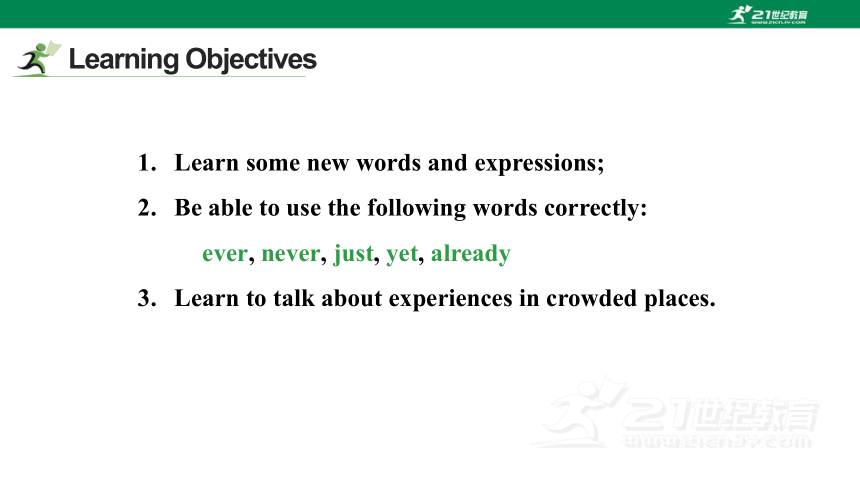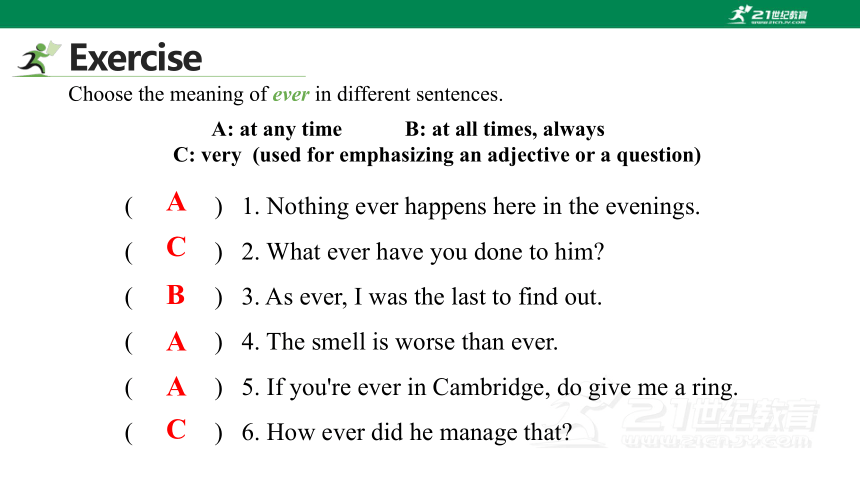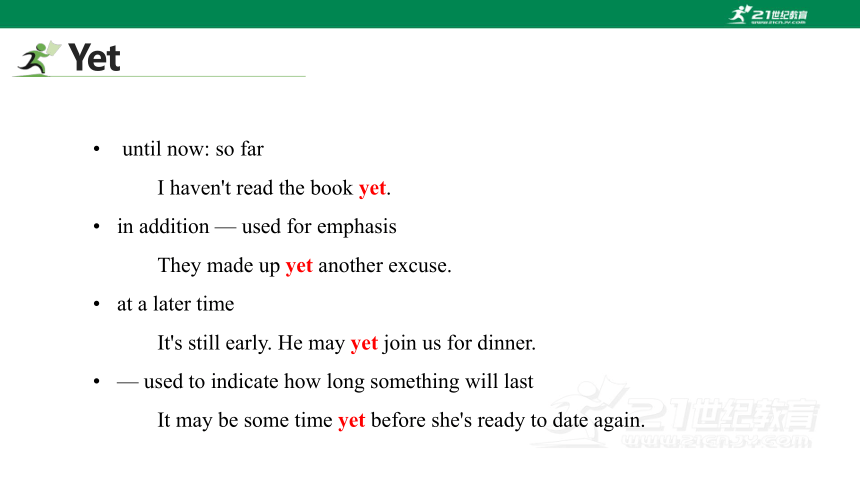Umit 1 Topic 2 Period 1 Listening & Speaking课件【对的英语】仁爱科普版九年级上册
文档属性
| 名称 | Umit 1 Topic 2 Period 1 Listening & Speaking课件【对的英语】仁爱科普版九年级上册 |  | |
| 格式 | pptx | ||
| 文件大小 | 10.2MB | ||
| 资源类型 | 试卷 | ||
| 版本资源 | 仁爱科普版 | ||
| 科目 | 英语 | ||
| 更新时间 | 2023-08-29 13:53:45 | ||
图片预览









文档简介
(共26张PPT)
Unit 1 The Changing World
Topic 2 The population in developing
countries is growing faster.
Period 1 Listening & Speaking
科普版九年级上册
Learning Objectives
Learn some new words and expressions;
Be able to use the following words correctly:
ever, never, just, yet, already
Learn to talk about experiences in crowded places.
Free talk
Have you ever been to a department store
How do you like it
Why do you think so
Look and learn
Make up conversations similar to the example with your partner.
A: Have you ever jumped rope
B: Yes. I have jumped rope.
/ No. I have never jumped rope.
EVER: at any time; at all times
chat online
go climbing
Exercise
Choose the meaning of ever in different sentences.
( ) 1. Nothing ever happens here in the evenings.
( ) 2. What ever have you done to him
( ) 3. As ever, I was the last to find out.
( ) 4. The smell is worse than ever.
( ) 5. If you're ever in Cambridge, do give me a ring.
( ) 6. How ever did he manage that
A: at any time B: at all times, always
C: very (used for emphasizing an adjective or a question)
A
C
B
A
A
C
Read and think
Read the conversation and understand the use of yet and already.
A: Have you had a happy weekend yet
B: Yes. I have just come back from Beijing.
A: Have you already been to the Great Wall
B: Not yet.
A: Why
B: There were so many tourists that I had to put off visiting there.
Already
before this time: before now
I've already told him the news.
so soon: so early
Have they arrived already I'm still not dressed!
- used to describe a situation that exists now and that will continue to exist
The book is already available in Britain.
Yet
until now: so far
I haven't read the book yet.
in addition — used for emphasis
They made up yet another excuse.
at a later time
It's still early. He may yet join us for dinner.
— used to indicate how long something will last
It may be some time yet before she's ready to date again.
Yet & Already
一般都知道,already用于肯定(“已经”),yet用于否定(“尚未”)。【例如】He has already left. 他已经离开了。/ He hasn't left yet. 他还没有离开。
在不带倾向性的一般疑问句中也同在否定句中一样,用yet而不用already(这是中国人不习惯的)。【例如】Has he left yet 他已经走了吗?而不说 Has he left already 回答时,如果是肯定,就要把原先问句中的yet改为already (Yes, he already has. 注意:already要提前到主语后、谓语前,谓语只留下助动词并重读,略去实义动词)。如果是否定回答,则可以说He hasn't yet.
但是,如果提问的人已经有了认为回答会是肯定的倾向性,则仍然可以用already而不用yet。【例如】Haven't you read this book already 你不会没看过这本书吧?或者提问时已经认为答案将是肯定的而只是为了表示惊讶而提问,也用already而不用yet。【例如】Is it May already 已经是五月了吗?/ Haven't you read this book already 你不是已经看过这本书了吗?/ Have you already finished your task 你真的完成了任务?
Exercise
Mariam: Is this the first time you've been to London
Yasemin: Yes, and we’ve _______ seen lots of places.
Mariam: Have you been to Buckingham Palace _________
Yasemin: Yes, we’ve _________seen that. We went there yesterday.
Mariam: What about the Tower of London
Yasemin: No, we haven't visited that _________. We'll probably go tomorrow.
Mariam: So what have you done this morning
Yasemin: We’ve _________ been to Big Ben. We were there ten minutes ago. That was great.
Mariam: Have you been to Hyde Park _________
Yasemin: Actually, we're waiting for a bus to go there now.
Mariam: Oh. You’ve ________ missed it. The next bus is in twenty minutes.
Complete the text with already, just or yet.
already
yet
already
yet
just
yet
just
Exercise
A: Have you ______ been to France
B: No, I’ve ______ been to any European countries,
but Michael has. He has ______ come back from
France. He likes it very much. He says he has
______ been to such a beautiful country before.
A: Have you seen him ______
B: Yes, I have seen him ________.
Complete the text with already, just, never, ever or yet.
ever
never
just
never
yet
already
Group work
Make a conversation in groups of four.
Try to use the following words correctly:
ever, never, just, already, yet
Listen and mark
( )1. Michael has just been to a shopping center.
( ) 2. Michael hates to go to the place because he couldn’t buy anything.
( ) 3. Kangkang and Michael went back home together.
( ) 4. Maria likes going there.
T
F
F
F
Listen and answer
Where has Michael been
Did he go there before
Do you think he like going there Why or why not
He has been to a shopping center.
No, he didn’t.
No, he doesn’t. Because there were so many people that they got lost.
Read and understand
Read 1a again and finish 3 on Page 10.
1. I always lose my way in New York.
I always _________in New York.
2. Yesterday Maria made a telephone call to Michael, but he wasn’t at home.
Yesterday Maria _______ Michael ____, but he wasn’t ____.
3. Mr. Brown is such a kind teacher that we all like him.
This teacher is so _____ that we all like him.
4. I don’t like to go to such a crowded place.
I _____ going to a crowded place _____ this.
5. I no more want to go there.
I _____ want to go there _____ _____.
get lost
called
up
in
kind
hate
like
don’t
any more
Read and think
What’s the meaning of the underlined sentence
Maria:
Michael:
Maria:
Michael:
Maria:
Michael:
Maria:
Hello, Michael. I have just called you, but you weren't in. Where have you been
I have just been to a shopping center with Kangkang. I've never been there before, but I don't want to go there any more.
Why not
Because there were too many people. We got lost and couldn't find each other.
Bad luck! Have you found him yet
No, he has probably gone home. Let’s call him up now. I really hate going to a place like that.
Maria: So do I.
Grammar
So do I. 是倒装句,表示前面提到的肯定情况也同样适合另外一个人或物,结构为“So+ be/情态动词/助动词+主语”。 如:
—They can swim well.他们游泳很棒。
—So can we. 我们也游得很好。
如果表示上文提到的否定情况也同样适合另外一个人或物,则用“neither/nor + "情态动词/ 助动词+主语”。 如:
— I don't like the weather here.我不喜欢这儿的天气。
— Neither/Nor does she.她也不喜欢。
Exercise
— Lucy dances very well.
— ____________
A. So Lily is. B. So Lily does. C. So is Lily. D. So does Lily.
D
— My brother can swim.
— ____________. (我也能。)
So I can.
— Maria is really a good student.
— ____________. (Lily也是。)
So is Lily.
Group work
Make a conversation in groups of four.
Try to use the following words and phrases correctly:
ever, never, just, already, yet,
not … any more, call up, get lost,
each other, hate, supermarket,
So do I.
Sharing
Act out your conversation.
Pay attention to your body language.
Exercise
(Steve and Helen are talking on the phone.)
Steve: I have just been living here for a few days. Could you tell
me some interesting places around here
Helen: Have you ______ been to the new shopping center
Steve: No. I’ve ______ been there before. But I’ve ______ been to
a department store.
Helen: Then you can go there to do some shopping. By the way,
have you ______ been to the cinema nearby
Steve: Yes, I’ve _______ watched a movie there. It is wonderful.
Helen: Have you been to the central park
Steve: No, I haven’t been there ______.
Helen: Then, you can have a walk there.
Steve: Thank you.
ever
never
just
ever
yet
already
Summary
We learn some new words and expressions;
some adverbs used in the present perfect tense;
We Can talk about crowded places;
use yet, already, ever, never, just correctly;
Jason says
As you know, I have ever been to Beijing many times. But Can you believe that I have never been to the Great Wall yet However, I have just received a letter from my friend, who works in Beijing. I have already written back to him to tell him that I’m going to visit the Great Wall next summer holiday.
Homework
Read 1a aloud and fluently; (All)
Make 5 sentences, using yet, ever, just, never, and already; (Level C)
Write a short passage about your shopping experience. (Level B)
Think about the advantages and disadvantages of a large population, and prepare a report. (Level A)
谢谢
21世纪教育网(www.21cnjy.com)
中小学教育资源网站
兼职招聘:
https://www.21cnjy.com/recruitment/home/admin
Unit 1 The Changing World
Topic 2 The population in developing
countries is growing faster.
Period 1 Listening & Speaking
科普版九年级上册
Learning Objectives
Learn some new words and expressions;
Be able to use the following words correctly:
ever, never, just, yet, already
Learn to talk about experiences in crowded places.
Free talk
Have you ever been to a department store
How do you like it
Why do you think so
Look and learn
Make up conversations similar to the example with your partner.
A: Have you ever jumped rope
B: Yes. I have jumped rope.
/ No. I have never jumped rope.
EVER: at any time; at all times
chat online
go climbing
Exercise
Choose the meaning of ever in different sentences.
( ) 1. Nothing ever happens here in the evenings.
( ) 2. What ever have you done to him
( ) 3. As ever, I was the last to find out.
( ) 4. The smell is worse than ever.
( ) 5. If you're ever in Cambridge, do give me a ring.
( ) 6. How ever did he manage that
A: at any time B: at all times, always
C: very (used for emphasizing an adjective or a question)
A
C
B
A
A
C
Read and think
Read the conversation and understand the use of yet and already.
A: Have you had a happy weekend yet
B: Yes. I have just come back from Beijing.
A: Have you already been to the Great Wall
B: Not yet.
A: Why
B: There were so many tourists that I had to put off visiting there.
Already
before this time: before now
I've already told him the news.
so soon: so early
Have they arrived already I'm still not dressed!
- used to describe a situation that exists now and that will continue to exist
The book is already available in Britain.
Yet
until now: so far
I haven't read the book yet.
in addition — used for emphasis
They made up yet another excuse.
at a later time
It's still early. He may yet join us for dinner.
— used to indicate how long something will last
It may be some time yet before she's ready to date again.
Yet & Already
一般都知道,already用于肯定(“已经”),yet用于否定(“尚未”)。【例如】He has already left. 他已经离开了。/ He hasn't left yet. 他还没有离开。
在不带倾向性的一般疑问句中也同在否定句中一样,用yet而不用already(这是中国人不习惯的)。【例如】Has he left yet 他已经走了吗?而不说 Has he left already 回答时,如果是肯定,就要把原先问句中的yet改为already (Yes, he already has. 注意:already要提前到主语后、谓语前,谓语只留下助动词并重读,略去实义动词)。如果是否定回答,则可以说He hasn't yet.
但是,如果提问的人已经有了认为回答会是肯定的倾向性,则仍然可以用already而不用yet。【例如】Haven't you read this book already 你不会没看过这本书吧?或者提问时已经认为答案将是肯定的而只是为了表示惊讶而提问,也用already而不用yet。【例如】Is it May already 已经是五月了吗?/ Haven't you read this book already 你不是已经看过这本书了吗?/ Have you already finished your task 你真的完成了任务?
Exercise
Mariam: Is this the first time you've been to London
Yasemin: Yes, and we’ve _______ seen lots of places.
Mariam: Have you been to Buckingham Palace _________
Yasemin: Yes, we’ve _________seen that. We went there yesterday.
Mariam: What about the Tower of London
Yasemin: No, we haven't visited that _________. We'll probably go tomorrow.
Mariam: So what have you done this morning
Yasemin: We’ve _________ been to Big Ben. We were there ten minutes ago. That was great.
Mariam: Have you been to Hyde Park _________
Yasemin: Actually, we're waiting for a bus to go there now.
Mariam: Oh. You’ve ________ missed it. The next bus is in twenty minutes.
Complete the text with already, just or yet.
already
yet
already
yet
just
yet
just
Exercise
A: Have you ______ been to France
B: No, I’ve ______ been to any European countries,
but Michael has. He has ______ come back from
France. He likes it very much. He says he has
______ been to such a beautiful country before.
A: Have you seen him ______
B: Yes, I have seen him ________.
Complete the text with already, just, never, ever or yet.
ever
never
just
never
yet
already
Group work
Make a conversation in groups of four.
Try to use the following words correctly:
ever, never, just, already, yet
Listen and mark
( )1. Michael has just been to a shopping center.
( ) 2. Michael hates to go to the place because he couldn’t buy anything.
( ) 3. Kangkang and Michael went back home together.
( ) 4. Maria likes going there.
T
F
F
F
Listen and answer
Where has Michael been
Did he go there before
Do you think he like going there Why or why not
He has been to a shopping center.
No, he didn’t.
No, he doesn’t. Because there were so many people that they got lost.
Read and understand
Read 1a again and finish 3 on Page 10.
1. I always lose my way in New York.
I always _________in New York.
2. Yesterday Maria made a telephone call to Michael, but he wasn’t at home.
Yesterday Maria _______ Michael ____, but he wasn’t ____.
3. Mr. Brown is such a kind teacher that we all like him.
This teacher is so _____ that we all like him.
4. I don’t like to go to such a crowded place.
I _____ going to a crowded place _____ this.
5. I no more want to go there.
I _____ want to go there _____ _____.
get lost
called
up
in
kind
hate
like
don’t
any more
Read and think
What’s the meaning of the underlined sentence
Maria:
Michael:
Maria:
Michael:
Maria:
Michael:
Maria:
Hello, Michael. I have just called you, but you weren't in. Where have you been
I have just been to a shopping center with Kangkang. I've never been there before, but I don't want to go there any more.
Why not
Because there were too many people. We got lost and couldn't find each other.
Bad luck! Have you found him yet
No, he has probably gone home. Let’s call him up now. I really hate going to a place like that.
Maria: So do I.
Grammar
So do I. 是倒装句,表示前面提到的肯定情况也同样适合另外一个人或物,结构为“So+ be/情态动词/助动词+主语”。 如:
—They can swim well.他们游泳很棒。
—So can we. 我们也游得很好。
如果表示上文提到的否定情况也同样适合另外一个人或物,则用“neither/nor + "情态动词/ 助动词+主语”。 如:
— I don't like the weather here.我不喜欢这儿的天气。
— Neither/Nor does she.她也不喜欢。
Exercise
— Lucy dances very well.
— ____________
A. So Lily is. B. So Lily does. C. So is Lily. D. So does Lily.
D
— My brother can swim.
— ____________. (我也能。)
So I can.
— Maria is really a good student.
— ____________. (Lily也是。)
So is Lily.
Group work
Make a conversation in groups of four.
Try to use the following words and phrases correctly:
ever, never, just, already, yet,
not … any more, call up, get lost,
each other, hate, supermarket,
So do I.
Sharing
Act out your conversation.
Pay attention to your body language.
Exercise
(Steve and Helen are talking on the phone.)
Steve: I have just been living here for a few days. Could you tell
me some interesting places around here
Helen: Have you ______ been to the new shopping center
Steve: No. I’ve ______ been there before. But I’ve ______ been to
a department store.
Helen: Then you can go there to do some shopping. By the way,
have you ______ been to the cinema nearby
Steve: Yes, I’ve _______ watched a movie there. It is wonderful.
Helen: Have you been to the central park
Steve: No, I haven’t been there ______.
Helen: Then, you can have a walk there.
Steve: Thank you.
ever
never
just
ever
yet
already
Summary
We learn some new words and expressions;
some adverbs used in the present perfect tense;
We Can talk about crowded places;
use yet, already, ever, never, just correctly;
Jason says
As you know, I have ever been to Beijing many times. But Can you believe that I have never been to the Great Wall yet However, I have just received a letter from my friend, who works in Beijing. I have already written back to him to tell him that I’m going to visit the Great Wall next summer holiday.
Homework
Read 1a aloud and fluently; (All)
Make 5 sentences, using yet, ever, just, never, and already; (Level C)
Write a short passage about your shopping experience. (Level B)
Think about the advantages and disadvantages of a large population, and prepare a report. (Level A)
谢谢
21世纪教育网(www.21cnjy.com)
中小学教育资源网站
兼职招聘:
https://www.21cnjy.com/recruitment/home/admin
同课章节目录
- Unit 1 The Changing World
- Topic 1 Our country has developed rapidly.
- Topic 2 The population in developing countries is
- Topic 3 The world has changed for the better.
- Unit 2 Saving the earth.
- Topic 1 Pollution has causes too many problems.
- Topic 2 All these problems are very serious.
- Topic 3 What can we do to protect the environment
- Unit 3 English around the World
- Topic 1 English is widely spoken around the world.
- Topic 2 Some things usually have different meaning
- Topic 3 Could you give us some advice on how to l
- Unit 4 Amazing Science
- Topic 1 When was it invented?
- Topic 2 I'm excited about the things that will be
- Topic 3 China is the third nation that sent a pers
